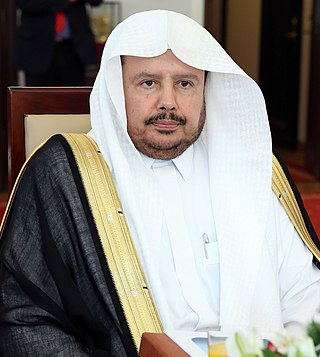
Riyadh is the capital and largest city of Saudi Arabia. It is also the capital of the Riyadh Province and the centre of the Riyadh Governorate. The current form of the metropolis emerged as an offshoot of the eponymous walled town following the dismantling of its defensive fortifications in the 1950s, after which the city underwent several phases of expansion and urbanization.

Saud bin Abdulaziz bin Abdul Rahman bin Faisal bin Turki bin Abdullah bin Mohammed bin Saud was King of Saudi Arabia from 9 November 1953 until his abdication on 2 November 1964. During his reign, he served as Prime Minister of Saudi Arabia from 1953 to 1954 and from 1960 to 1962. Prior to his accession, Saud was the country's crown prince from 11 May 1933 to 9 November 1953. He was the second son of King Abdulaziz, the founder of Saudi Arabia.

The House of Al Saud is the ruling royal family of Saudi Arabia. It is composed of the descendants of Muhammad bin Saud, founder of the Emirate of Diriyah, known as the First Saudi State (1727–1818), and his brothers, though the ruling faction of the family is primarily led by the descendants of Abdulaziz bin Abdul Rahman, the modern founder of Saudi Arabia. It forms a subtribe of the larger prominent ancient Banu Hanifa tribe of Arabia, from which well known 7th century Arabian theologist Maslama ibn Ḥabīb originates. The most influential position of the royal family is the King of Saudi Arabia, an absolute monarch. The family in total is estimated to comprise 15,000 members; however, the majority of power, influence and wealth is possessed by a group of about 2,000 of them. Some estimates of the royal family's wealth measure their net worth at $1.4 trillion. This figure includes the market capitalization of Saudi Aramco, the state oil and gas company, and its vast assets in fossil fuel reserves, making them the wealthiest family in the world and the wealthiest in recorded history.

Sultan bin Abdulaziz Al Saud, called Sultan the Good in Saudi Arabia, was the Saudi defense minister from 1963 to 2011 and the Crown Prince of Saudi Arabia from 2005 until his death in October 2011.

Salman bin Abdulaziz bin Abdul Rahman bin Faisal bin Turki bin Abdullah bin Mohammed bin Saud is King of Saudi Arabia, reigning since 2015, and was also Prime Minister of Saudi Arabia from 2015 to 2022. The 25th son of King Abdulaziz, the founder of Saudi Arabia, he assumed the throne on 23 January 2015. Prior to his accession, he was Crown Prince of Saudi Arabia from 18 June 2012 to 23 January 2015. Salman is the third oldest living head of state, the oldest living monarch, and Saudi Arabia's first head of state born after the unification of Saudi Arabia. He has a reported personal wealth of at least $18 billion, which makes him the third wealthiest royal in the world.

Imam Mohammad Ibn Saud Islamic University (IMSIU) (Arabic: جامعة الإمام محمد بن سعود الإسلامية), commonly known as Al-Imam University, is a public university in the sub-municipality of Shemal in Riyadh, Saudi Arabia. It was founded in 1950 as an Islamic seminary by Muhammad ibn Ibrahim ash-Sheikh, the first Grand Mufti of Saudi Arabia. It was renamed the College of Sharia in 1953, before becoming a full-fledged university through amalgamations of other colleges and assuming its current name in 1974. The university also has overseas presence in Indonesia and Djibouti.

The Emirate of Nejd or Imamate of Nejd was the Second Saudi State, existing between 1824 and 1891 in Nejd, the regions of Riyadh and Ha'il of what is now Saudi Arabia. Saudi rule was restored to central and eastern Arabia after the Emirate of Diriyah, the First Saudi State, having previously been brought down by the Ottoman Empire's Egypt Eyalet in the Ottoman–Wahhabi War (1811–1818).
Princes' School is a school in Riyadh, Saudi Arabia.

Articles related to Saudi Arabia include:
Turki bin Abdulaziz Al Saud was a Saudi Arabian politician and businessman. A member of the House of Saud, he was the full brother of King Fahd and King Salman.

Abdullah ibn Muhammad Al ash-Sheikh is the chairman of the Majlis ash-Shura of Saudi Arabia since February 2009. He was the minister of Justice from February 1992 to February 2009.

The legal system of Saudi Arabia is based on Sharia, Islamic law derived from the Quran and the Sunnah of the Islamic prophet Muhammad. The sources of Sharia also include Islamic scholarly consensus developed after Muhammad's death. Its interpretation by judges in Saudi Arabia is influenced by the medieval texts of the literalist Hanbali school of Fiqh. Uniquely in the Muslim world, Sharia has been adopted by Saudi Arabia in an uncodified form. This, and the lack of judicial precedent, has resulted in considerable uncertainty in the scope and content of the country's laws. The government therefore announced its intention to codify Sharia in 2010, and, in 2018, a sourcebook of legal principles and precedents was published by the Saudi government. Sharia has also been supplemented by regulations issued by royal decree covering modern issues such as intellectual property and corporate law. Nevertheless, Sharia remains the primary source of law, especially in areas such as criminal, family, commercial and contract law, and the Qur'an and the Sunnah are declared to be the country's constitution. In the areas of land and energy law the extensive proprietorial rights of the Saudi state constitute a significant feature.
The following is a Gregorian timeline of the history for the city of Riyadh, Saudi Arabia.

The judiciary of Saudi Arabia is a branch of the government of Saudi Arabia that interprets and applies the laws of Saudi Arabia. The legal system is based on the Islamic code of Sharia, with its judges and lawyers forming part of the country's religious leadership or ulama. There are also non-Sharia government tribunals which handle disputes relating to specific royal decrees. Final appeal from both Sharia courts and government tribunals is to the King of Saudi Arabia and all courts and tribunals follow Sharia rules of evidence and procedure.

Abdulaziz bin Abdul Rahman Al Saud (1875–1953), the founder and first king of Saudi Arabia, also called Ibn Saud, was very young when he first got married. However, his wife died shortly after their marriage. Ibn Saud remarried at eighteen and his firstborn child was Prince Turki I. He had 45 sons of whom 36 survived to adulthood and had children of their own. He also had many daughters. He is thought to have had 22 wives.

Issa Abdullah bin Abdulrahman Al-Ghaith is a judge, Islamic scholar, author, and activist. He is a member of the Consultative Assembly of Saudi Arabia and King Abdulaziz Center for National Dialogue. He received a doctor's degree in Sharia and Law College in Al-Azhar University in Cairo, Egypt.

Saud bin Abdullah al-Qahtani is a Saudi Arabian consultant and former royal court advisor. Prior to his dismissal in late 2018, he worked as an advisor to King Abdullah of Saudi Arabia and crown prince Mohammed bin Salman.

Saad ibn Nasser al-Shathri is an Islamic scholar from Saudi Arabia. Since 2015, he has been a member of the country's Council of Senior Scholars and an advisor to the royal court of King Salman.

Al-Hukm Palace, originally Ibn Dawwas Palace, and also known as the al-ʽAdl Palace, so called from the public square it overlooks from the south, is a historic palace and a popular cultural heritage landmark in the ad-Dirah neighbourhood of Riyadh, Saudi Arabia, located directly opposite to Imam Turki bin Abdullah Grand Mosque in the Qasr al-Hukm District. It is the historic site where tribal leaders and members of the Saudi royal family have been pledging allegiance to the country's political leadership. It was built in 1747 by Dahham ibn Dawwas alongside the city wall to safeguard the walled town from invaders and intruders. In the 1820s, Turki bin Abdullah, after gaining control of Najd, shifted the royal family's center of power from Diriyah to the walled town of Riyadh due to the former's severe destruction in a brutal siege during the Ottoman–Wahhabi War of 1818 as well as the town’s Ottoman sacking in 1821.

Saudi Founding Day, officially the Founding Day, is a public holiday in Saudi Arabia celebrated annually on February 22 to commemorate the enthronement of Muhammad bin Saud as the emir of the oasis town of Diriyah in 1727 following the death of his father Saud al-Muqrin, the eponymous ancestor of the al-Saud family. His hereditary succession is considered as the prelude to the inception of the First Saudi State, the antecedent to the Second Saudi State and present-day Kingdom of Saudi Arabia. It was founded in 2022 on its 295th anniversary when King Salman bin Abdulaziz issued a royal decree that designated it as a legal holiday to be observed as per the Gregorian calendar. It is one of the three non-religious national holidays observed in the country, other being the Saudi National Day and Saudi Flag Day.
















